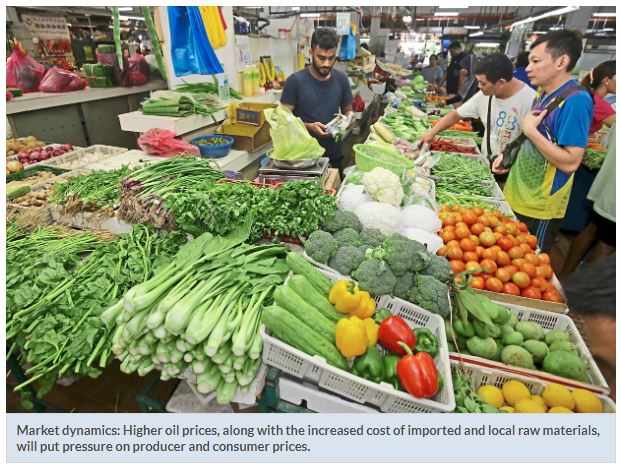Malaysia: Mind the rising crude oil prices
GLOBALLY, prices of commodities like oil, food and base metals, as well as raw materials, have rebounded strongly from the low in 2020 on the back of positive news about the Covid-19 vaccine trials and mass vaccination programmes.
The World Bank reported that between April 2020 and February 2021, food prices have gone up by 33.4%, raw materials such as timber and rubber rose by 18.9%, while metals and minerals increased by 62.5%.
Brent crude oil prices have risen by 40.7% to average US$58.67 (RM241) per barrel as of March 1 (average US$56.87 in 2020) and Brent crude oil futures surged above US$70 a barrel on March 8 for the first time since the Covid-19 pandemic began.
Besides the global vaccination drive fuelling strong global recovery and renewed fuel consumption, geopolitical tensions in the Middle East has also stirred up the geopolitical risk premium in oil markets.
Higher crude oil prices come in very handy at this time to make up for a potential shortfall in the Ministry of Finance’s (MoF) projected tax revenue collection (+14.6% to RM131.9bil) in Budget 2021. It expects corporate income tax to increase by 8.8% to RM64.6bil and personal income tax to jump by 18.2% to RM42.4bil in 2021.
Most businesses are still reeling from a year-long pandemic impact, and hence are likely to make lower profit or be in the red, especially for the tourism-related and retail sectors.
The projected collection from individual tax payers would be hampered by lower income, including bonus payout, salary cuts and small salary increments amid the still high jobless rate (4.9% at end-January or 782,500 persons) given the high number of employees who lost their jobs a year ago.
During Budget 2021 presented in November 2020, the MoF estimated petroleum-related revenue to come in at 16% of total revenue or RM37.9bil (Petronas dividend of RM18.0bil), based on crude oil assumption of US$42 per barrel, which now looks conservative compared with the current average prices (US$58.67 per barrel from January to March 1).
Oil “supercycle” traders predict crude oil prices could rise as high as US$100 per barrel as the world economy rebounds and the pandemic abates.
Taking an average oil price of US$65 to US$75 per barrel, oil-related revenue could jump by between RM6.9bil and RM9.9bil. It is estimated that for every US$10 per barrel increase in the price of oil, it will add RM300mil in revenue. The windfall gain may see Petronas raise its dividend contribution to the government.
The offsetting effect on the oil revenue windfall gain is the fuel subsidy, which is estimated to cost between RM3.6bil and RM10.1bil. The government decided to cap the retail price of RON95 petrol and diesel at RM2.05 and RM2.15 per litre, respectively to protect consumers from the effects of any drastic spike in oil prices.
Based on crude oil prices of between US$65 and US$75 per barrel, the retail prices of RON95 would cost between RM2.15 and RM2.41 per litre, an increase of between RM0.10 and RM0.36 from the capped price of RM2.05 per litre. For diesel, the estimated price is between RM2.39 and RM2.65 per litre, RM0.24 and RM0.50 higher than the ceiling price of RM2.15 per litre.
On a net basis, it is estimated that the impact of higher oil prices will show a net gain of between RM3.3bil and net loss of RM0.2bil assuming an oil price of between US$65 and US$75 per barrel. It must be mindful that oil price variability and market dynamics will make oil revenue a variable component of the Federal revenue.
Another aspect of higher oil prices (petrol prices), along with the increased cost of imported and local raw materials, would result in producer and consumer price pressures.
If firms are expecting the price of raw materials to increase, they will be more likely to increase prices to protect their profit margins although the quantum of price increase may be capped by cautious consumer demand and the slowing economy.
Our survey shows that more than 60% of respondents, which reported that both prices of local and imported raw materials have increased significantly in the second half of 2020, are expecting prices to continue rising in the first half of this year.
A majority of them foresee that prices will rise by more than 10%. During the challenging period, about one-third of respondents (30.8%) expect to sell their products at cheaper prices to sustain their market share in the first half while 24.7% of respondents will increase prices, mainly by 1% to 15% in the same period.
Cost-push inflation expectations will set in as consumers expect future inflation to rise on the back of higher fuel prices and the eventual cost pass-through impact from businesses and producers, if they unable to absorb the increasing cost of inputs and raw materials.
My channel checks indicate that some restaurants have raised prices of food due to the increase in the price of ingredients and preparation. Inflation expectations can become a self-fulfilling prophecy. If workers expect future inflation, they are more likely to bargain for higher wages to compensate for the higher cost of living. If workers can successfully bargain for higher wages, this will contribute towards inflation.
Source: https://www.thestar.com.my/business/business-news/2021/03/17/mind-the-rising-crude-oil-prices


 English
English




